How Refugee Entrepreneurs in the Levant Region are Growing their Businesses
StartMashreq's incubation program is shaping a “startup ecosystem” in Iraq, Jordan, and Lebanon
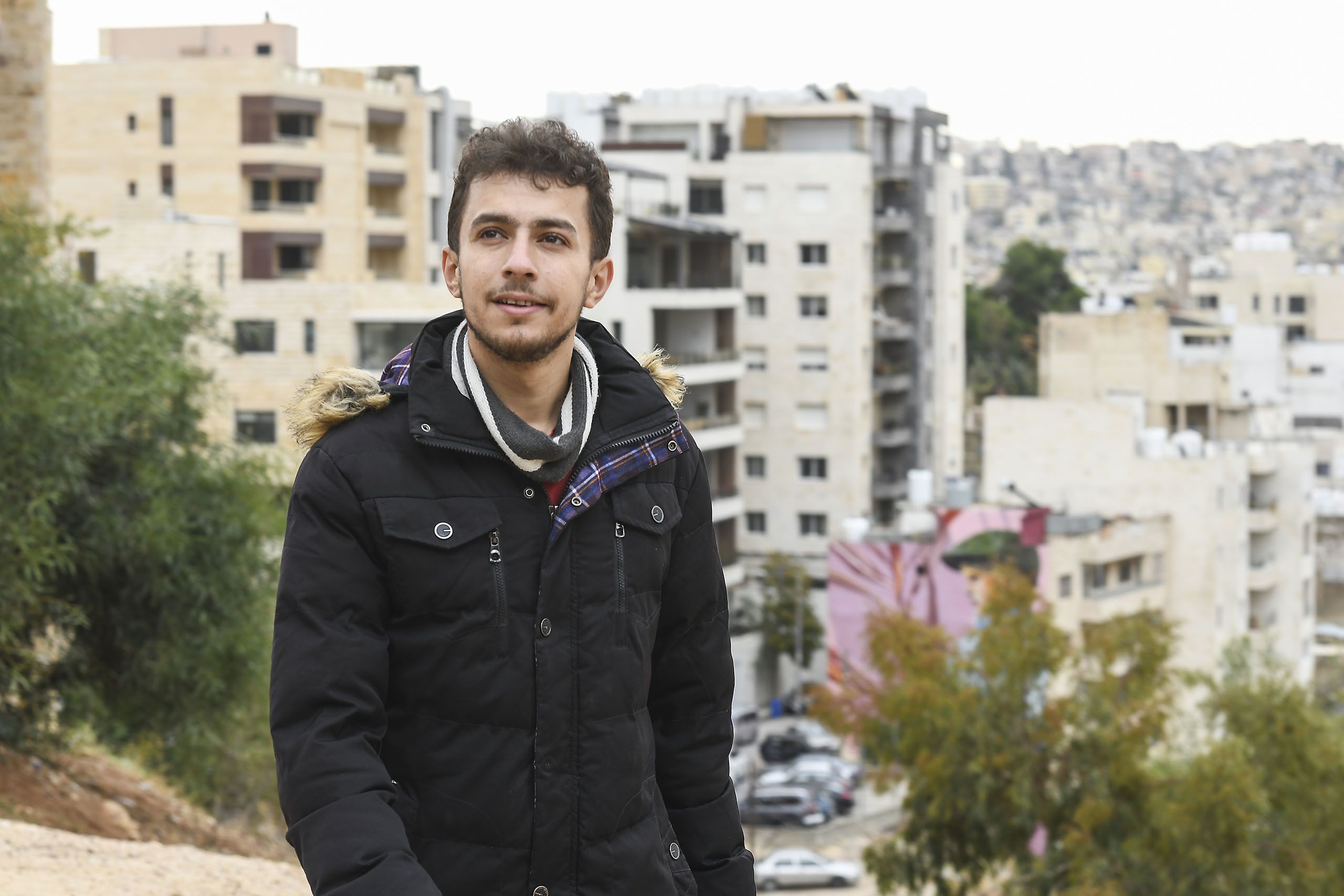
By Sara Aggour. Photos and videos by Nadia Bseiso.
It’s almost time for Ahmed Owier—full-time entrepreneur, part-time tile installer—to deliver his pitch for an award that brings him a step closer to accomplishing his dream. Owier has been preparing for his big moment since he and his family fled Syria and settled in Jordan in 2011, when he was 13 years old.
He takes a break from installing tiles and turns on the laptop he borrowed from a friend. Since he didn’t have time to change out of his dusty work clothes, he decides not to use the camera.
Over the audio connection, he explains the idea behind his startup, Scrap, to judges at the 2020 International Entrepreneurship Symposium, a forum that aims to spotlight young and inspiring entrepreneurs. Scrap is an online platform where individuals and businesses can sell a wide range of used items, he tells them, and the idea for it grew out of his own experience as a refugee.
The judging doesn’t take long, and Owier soon gets the good news: he received the first-place certificate, a prize for the entrepreneur with the most compelling idea. Encouraged by the win, he decides to continue applying for incubation programs.
Ever since he and his family arrived in Jordan, he has nurtured the hope of establishing his own business. That’s partly because his family was forced to leave everything behind in Syria, including essential documents like Owier’s education certificates. Without those—and faced with the responsibility of supporting his family—he stopped going to school.
Owier’s job as a tile installer doesn’t offer stability or a steady paycheck, and for him, entrepreneurship is the only option that combines meaningful work with the flexibility he needs.
Though Owier’s business idea for Scrap is unique, his background is shared by many. He is one of more than 14 million Syrians who were forced to leave their homes since the 2011 conflict. Approximately 5.5 million Syrian refugees live in the five countries neighboring Syria: Türkiye, Lebanon, Jordan, Iraq, and Egypt.
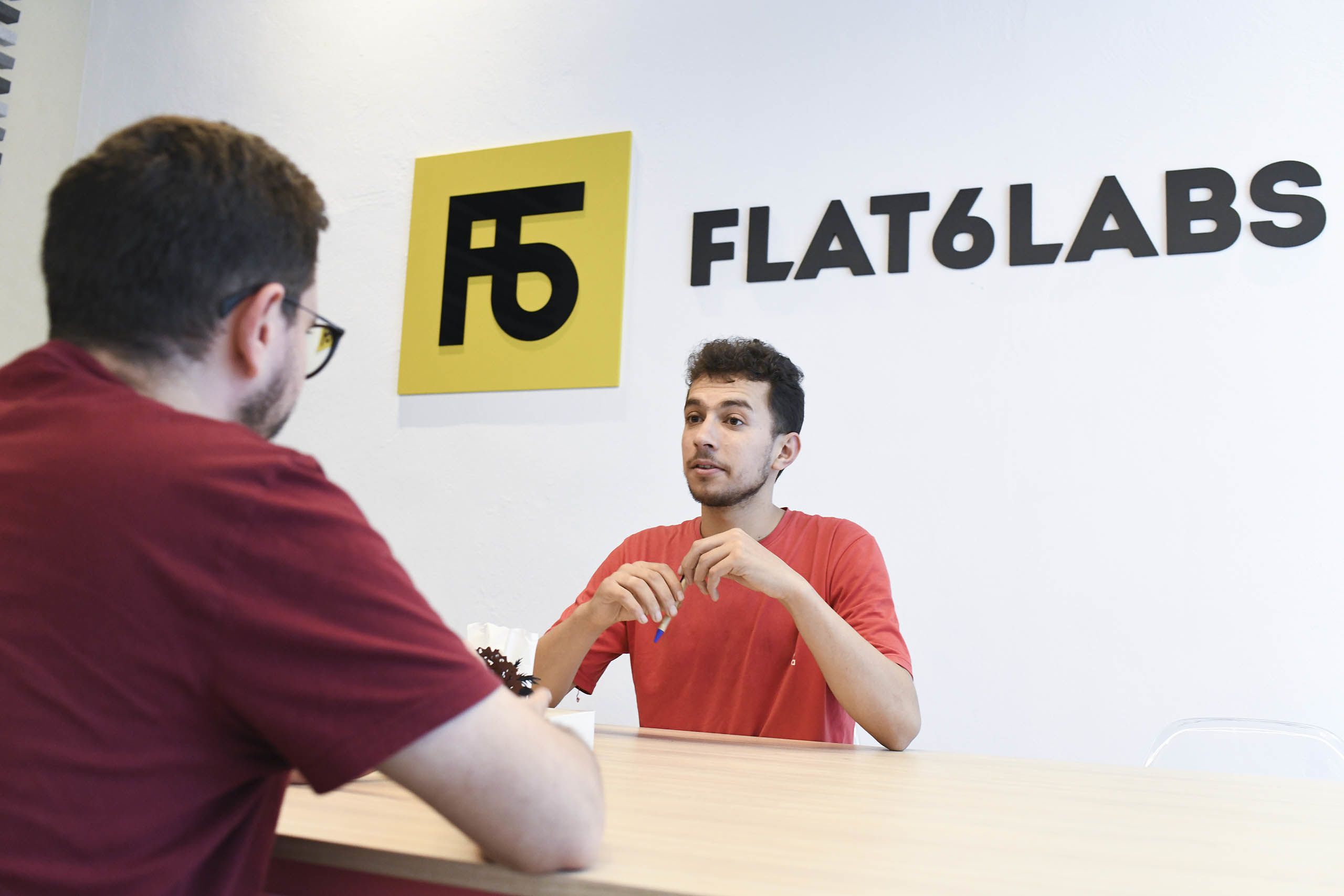
Entrepreneurs like Owier face many challenges in addition to the barriers most entrepreneurs must overcome, according to Menan Omar, an IFC Operations Officer. That's why refugee entrepreneurs need a different kind of support, she stresses.
Omar is the co-lead for the StartMashreq program, an IFC advisory program launched in 2023. The program offers mentorship, coaching, and support to entrepreneurs in underprivileged communities, especially women and forcibly displaced people, so they can become investment-ready and develop their business. It is led and implemented by Flat6Labs, the region’s leading seed and early-stage venture capital firm.
The program helps to show that refugees can be seen as “part of the solution [helping society] rather than part of the problem,” Omar says, noting that refugees’ potential economic contributions can counter the perception that they destabilize an already-stressed host country.
Owier applied for the first round of the StartMashreq incubator program and is among five refugees enrolled in Jordan. StartMashreq is part of a larger initiative that supports entrepreneurs across Lebanon, Iraq, and Jordan. "Mashreq," which is driven from the Arabic word "Al Sharq," or "east," refers to the eastern part of Arab world.
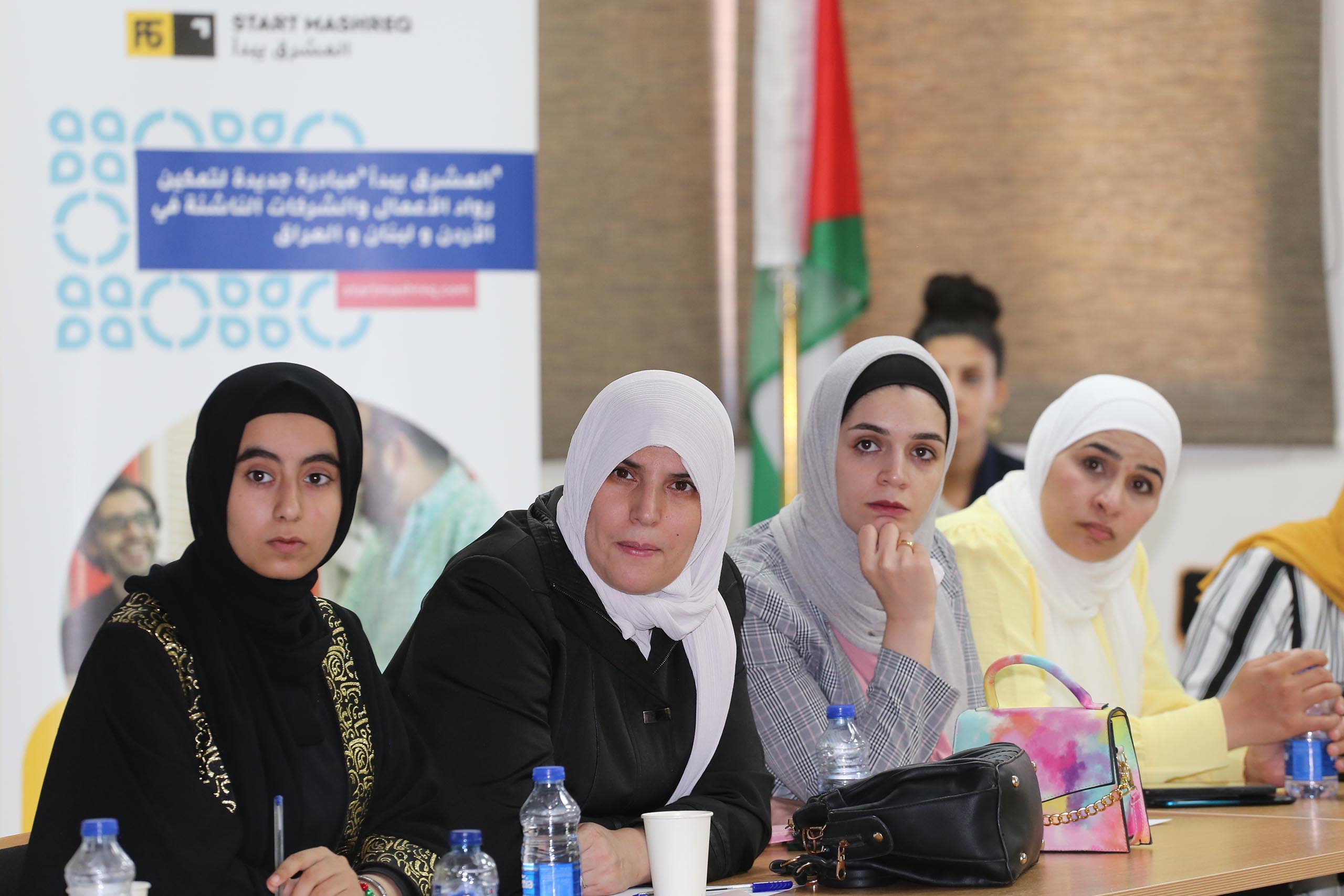
A learning program at Flat6labs. Photo courtesy: Flat6Labs.
A learning program at Flat6labs. Photo courtesy: Flat6Labs.
The StartMashreq program was designed to equip entrepreneurs, including refugees, women, and others in vulnerable communities, with education, training, and advice to develop their ideas into successful startups. The goal is to help change the way governments and stakeholders, including the private sector, respond to the refugee crisis in Middle East region, according to Omar.
“We recognize the positive and long-term employment outcomes associated with entrepreneurship and the need for the private sector to lead innovation,” she says. “StartMashreq stresses a continuum between the humanitarian response and the country’s development agenda by improving the overall environment in which entrepreneurs operate and by strengthening their capabilities, including the capabilities of refugee entrepreneurs.”
“We recognize the positive and long-term employment outcome associated with entrepreneurship and the need for the private sector to lead innovation.”
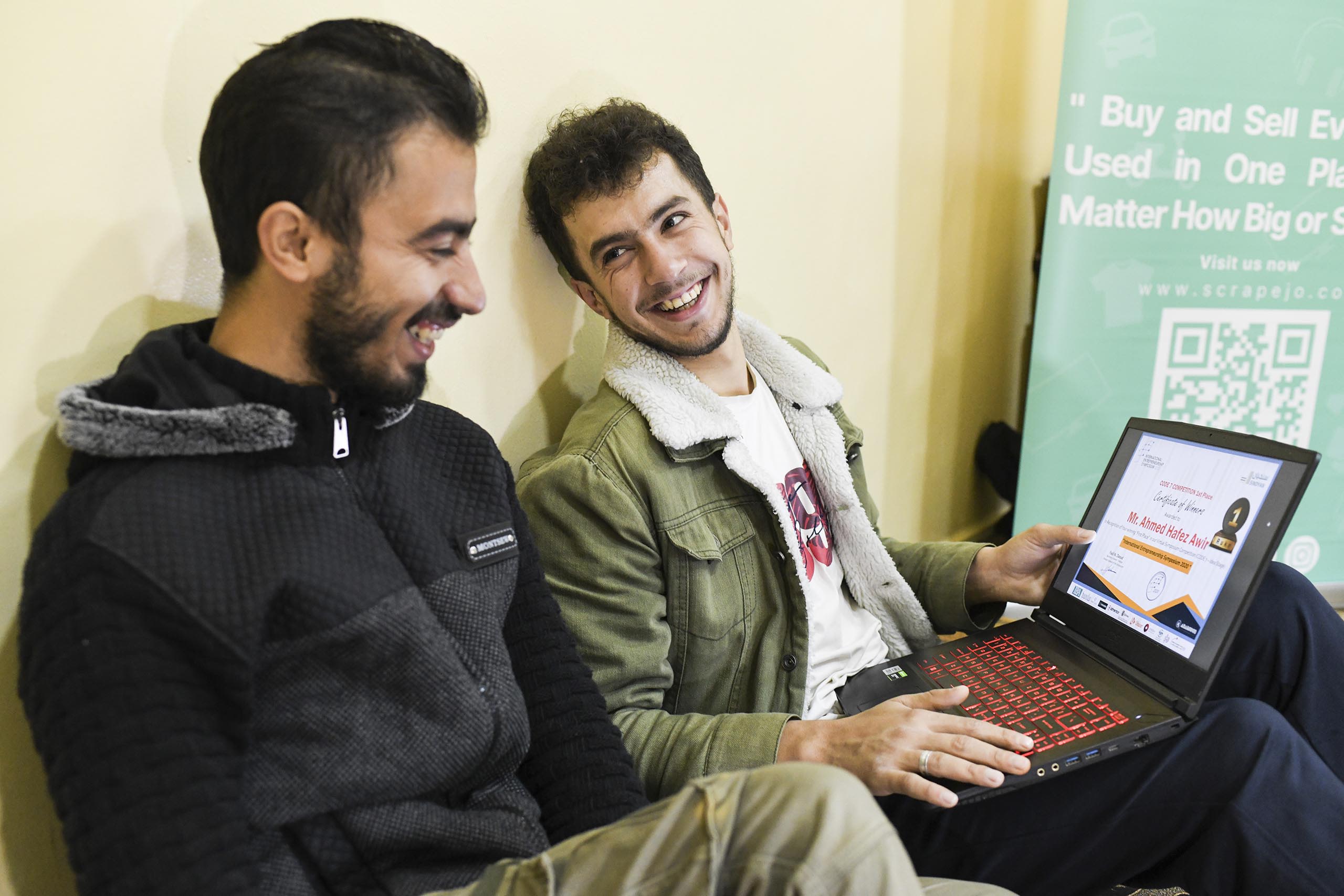
Owier shows his first-place certificate, a prize for the entrepreneur with the most compelling idea, from the 2020 International Entrepreneurship Symposium.
Owier shows his first-place certificate, a prize for the entrepreneur with the most compelling idea, from the 2020 International Entrepreneurship Symposium.
Reaching the unreachable
StartMashreq aims to help 120 startup founders who are between the ages of 18 and 45. The program offers educational content, mentorship, and advice to help these early-stage entrepreneurs develop their ideas and grow their business. It has three strands: a growth support program, the incubation program, and a learning program.
The tailored incubation program— which supported 25 startups in its first round—addresses the specific needs of each startup. It offers targeted support for the development of business ideas and business plans, and connects founders to a team of financial and legal advisors to help them manage and register their companies.
This program “brings a private sector solution to a context of fragility and conflict all while reaching the unreachable [entrepreneurs],” Omar says. “IFC partnered with Flat6Labs because we knew it had the capacity, expertise, technical knowledge, and regional credibility to undertake this endeavor.”
Ragia Amr, the Program Director at Flat6labs, says that it provides the StartMashreq entrepreneurs with learning sessions and hands-on mentorship and coaching, matching them with specialized coaches to help them address their specific needs.
“Mentorship and coaching engagements are designed with the purpose of transforming plans and strategies into action,” Amr adds, stating that the program is poised to support entrepreneurs to take their business from an idea to its growth and scaling stages.
StartMashreq is supported by IFC under the Prospects Partnership, a global initiative funded by the Government of the Netherlands that includes UNICEF, UNHCR, the International Labour Organization (ILO), IFC, and the World Bank. The global partnership aims to improve the access of host communities and forcibly displaced people to education, social protection, and decent work.
“Mentorship and coaching engagements are designed with the purpose of transforming plans and strategies into action.”
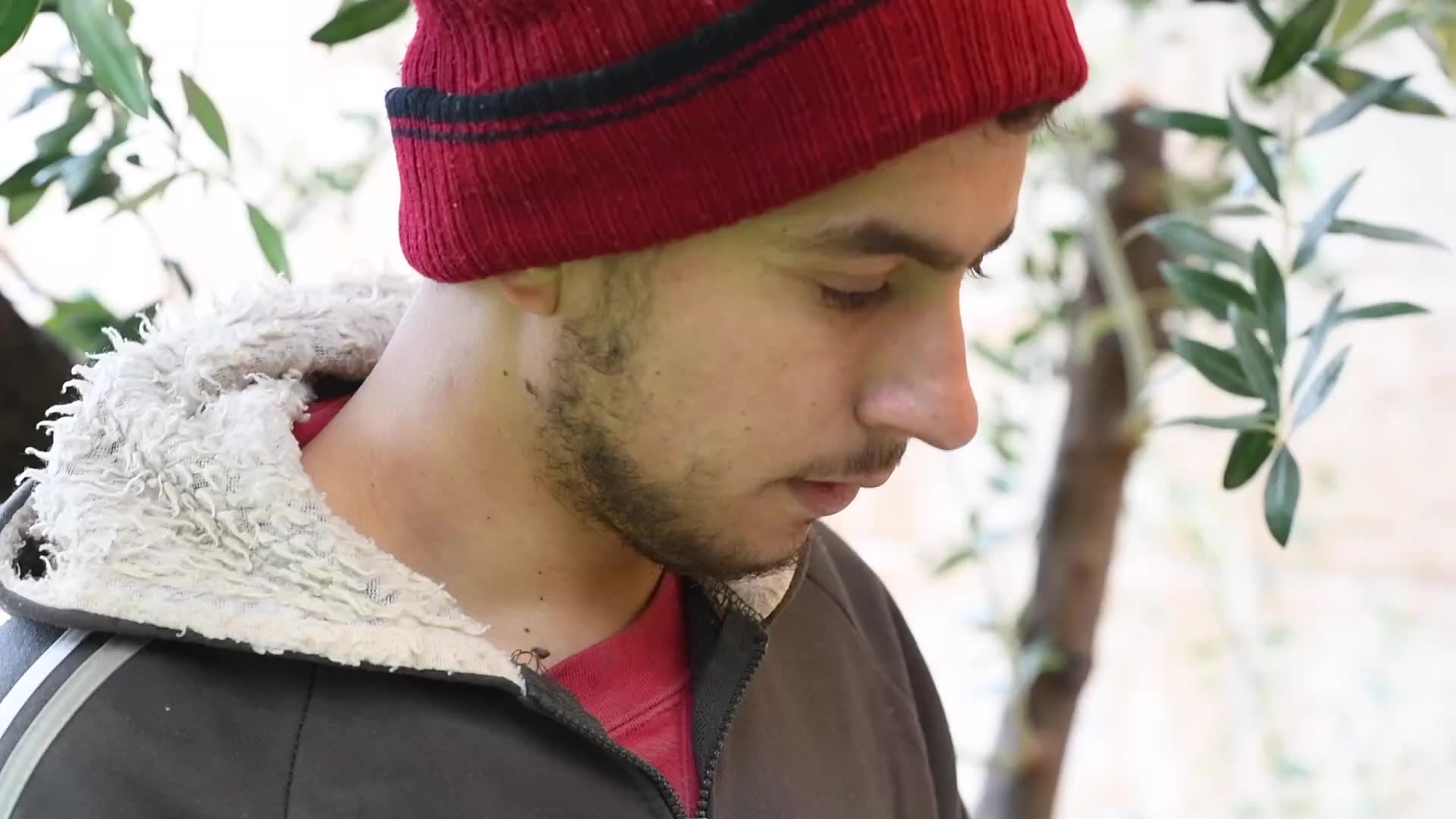
Necessity is the mother of entrepreneurship
Owier, who developed the idea for Scrap in 2022, understood early on that he had the commitment and the drive to start a company, even if his education was untraditional. “A degree is not a prerequisite for entrepreneurship. I relied on online courses and enrolled in incubation programs to learn,” Owier says.
In just over a year, he developed Scrap into a platform dedicated to selling a wide range of used items, spanning from car parts and electronics to clothing. With a mission to champion a more sustainable approach to recycling, the company has successfully attracted over 2000 registered users and facilitated the sale of more than 4 tons of used products.
Ahmad Al Kordi, a Palestinian refugee residing in Lebanon, had a more traditional education—a bachelor’s degree in industrial engineering—but felt that career opportunities are limited for refugees.
That’s why he started his own company. Al Kordi’s Infinite Cycle is an online platform designed to help delivery couriers in Lebanon. These couriers earn their daily wages based on the number of deliveries completed, but often struggle with servicing their motorcycles. The platform focuses on expediting supply chain operations for motorcycle spare parts. It connects spare parts suppliers, maintenance centers, and motorcycle drivers, which keeps couriers from losing a day’s worth of work.
Al Kordi’s innovative idea offered a much-needed solution for couriers in Lebanon, but it required refinement to turn into a business plan that responds to a market need. That made his case a great fit for the StartMashreq incubator program.
Unmatched challenges
The challenges faced by refugees who are entrepreneurs are different from the struggles of other start-up founders, according to Saleem Najjar, a Syrian investor and the founder of Umbrella 500. He left Syria in 2012, and while living in Jordan he was able to raise over $3 million for one of his startups.
Now he runs several companies that provide technical, legal, and psychological support to startup founders, allowing them to turn their ideas into business. He also offers coaching sessions to the entrepreneurs registered in StartMashreq.
“The challenge of getting paperwork done is real and needs constant innovative workarounds,” Najjar says. He adds that refugee entrepreneurs don’t have the luxury of time: a refugee entrepreneur needs to develop a profitable idea sooner rather than later, because their families’ livelihoods depends on it. As a coach, his priority is to “help entrepreneurs pivot their ideas to help them make money because they have mounting responsibilities.”
Work permits and access to finance are also a struggle for refugees who are entrepreneurs, Al Kordi says.
According to UNHCR, the UN refugee agency, 59 percent of refugees live in countries with restricted access in practice to registering and operating a business. For example, only 4 percent of the people in Jordan’s largest refugee camp, Zaatari, have been offered a work permit, according to UNHCR. That adds up to fewer than 3,500 people among the 80,000 refugees who reside in the camp.
This leads to negative consequences for many refugees. According to UNHCR data from eight host countries, refugees are 60 percent more likely than host populations to be working in the informal sector, where they can be subjected to a broad range of challenges, including underpayment, risk of injury, job insecurity, lack of rights, and discrimination.
Moreover, over 50 percent of refugees live in countries where the legislation does not recognize UNHCR- or government-issued ID as a valid document to open a bank account, UNHCR indicates.
“Without the proper paperwork, I can’t apply for a bank loan and even reaching out to investors becomes a challenge,” Al Kordi explains.
“The challenge of getting paperwork done is real and needs constant innovative workarounds.”
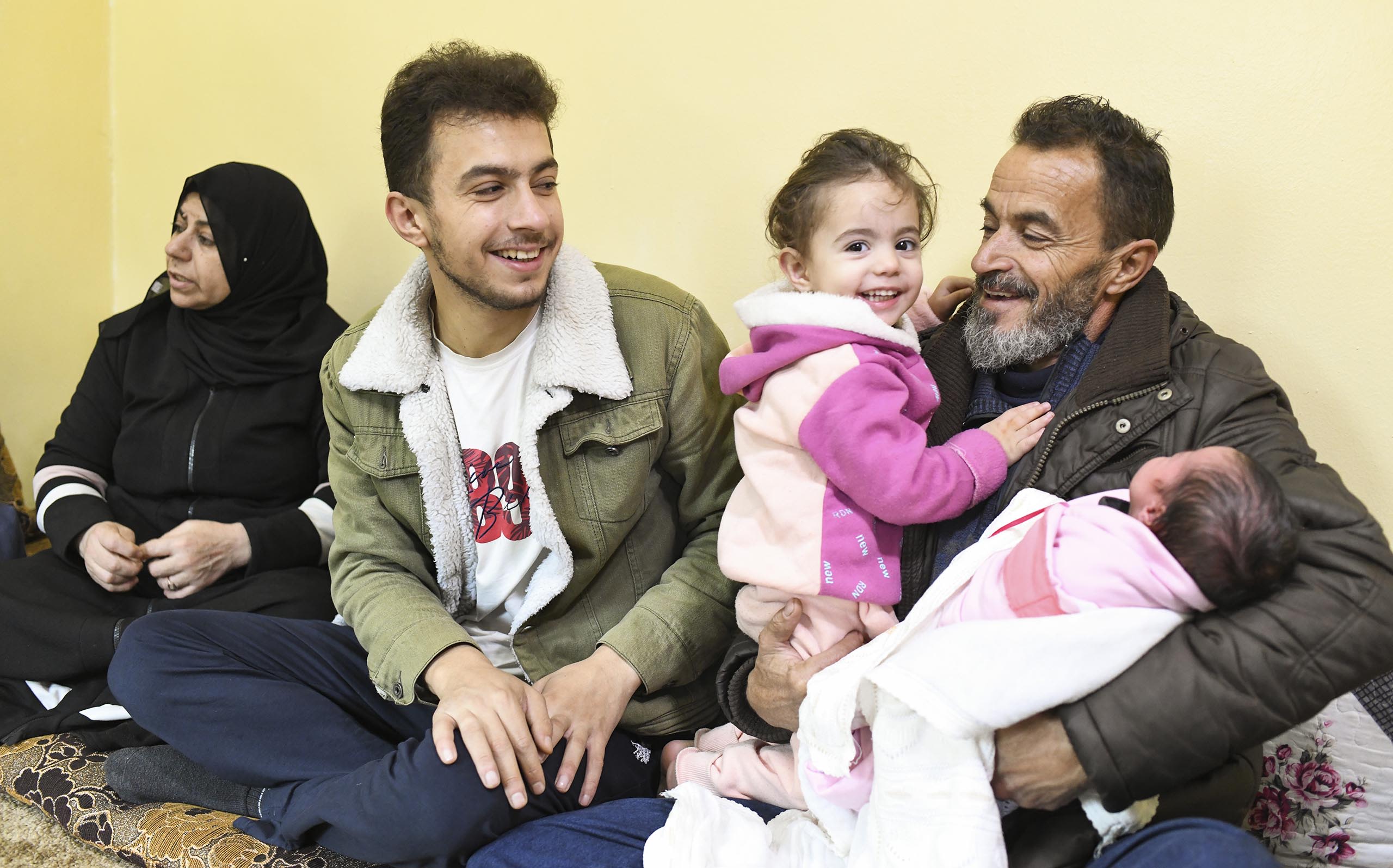
Owier with his extended family.
Owier with his extended family.
Overcoming obstacles
Stereotypes and unconscious bias against refugees are another challenge these entrepreneurs face.
Tawfik Elrjula, a Netherlands-based Syrian investor and founder of cryptocurrency startup Fluus, explains that accessing finance as an entrepreneur is difficult, but once an investor hears the label “refugee,” it becomes an even bigger obstacle.
“Investors are hesitant to fund refugee startups and they perceive such investments as high risk,” Najjar adds. “They [refugee entrepreneurs] also face constant struggles to get their company on its feet, which increases the investors’ reluctance.” This reluctance, according to Najjar, can rob investors of excellent investment opportunities.
Najjar stresses that investors should overcome this unconscious bias and look at refugee entrepreneurs without the additional labels.
A 2023 World Bank study recommends that investors should sharpen the focus on refugee investment and capture the nuances of different investment strategies. Its recommendations also include taking a focused approach toward investments and creating tailored business cases that factors in the different risks and rewards.
StartMashreq addresses those challenges by offering the necessary legal support to help refugee entrepreneurs register their companies.
“I think one of the first requests I made was to be able to legally register my company,” Owier says, adding that the program immediately connected him to his coach, Najjar, so he could find a pathway to do that.
Al Kordi says that the program helped him develop a growth strategy for his company and create a focused approach that would help him scale over a four-stage plan.
The program’s specific focus on forcibly displaced people and female entrepreneurs recognizes the intersectionality of the challenges both communities face, according to Amr. This helps it provide tailored and holistic support that takes into consideration cultural sensitivities.
“This intersectional approach allows for a more comprehensive understanding of the obstacles faced and ensures that solutions are tailored to the specific needs of this diverse group,” Amr adds.
Sometimes, the challenges come from within. Amr explains that cultural norms and social expectations can discourage individuals from vulnerable communities, particularly women and minorities, from pursuing entrepreneurial activities.
StartMashreq targets that challenge, too.
"At our events, we strive to get the support of respected community leaders who help bridge the gap," Amr says. "[We introduce entrepreneurs to] successful female entrepreneurs and mentors from similar backgrounds as role models because they are people who share the same norms and concerns, and this can help to overcome these obstacles.”
Elrujula has seen first-hand the power of this approach. “Providing resilient refugees with genuine opportunities is like offering them superpowers,” he says.
When they have these opportunities, they succeed, Najjar says, pointing to sources that show that a record number of immigrants succeed because that’s the only option they have. “They are coachable, open to options, and are comfortable with being uncomfortable.”
“Success for refugee entrepreneurs is about survival,” Omar says. “They have a strong incentive to prove that they can contribute to the economies of the countries that host them.”
“Providing resilient refugees with genuine opportunities is like offering them superpowers.”
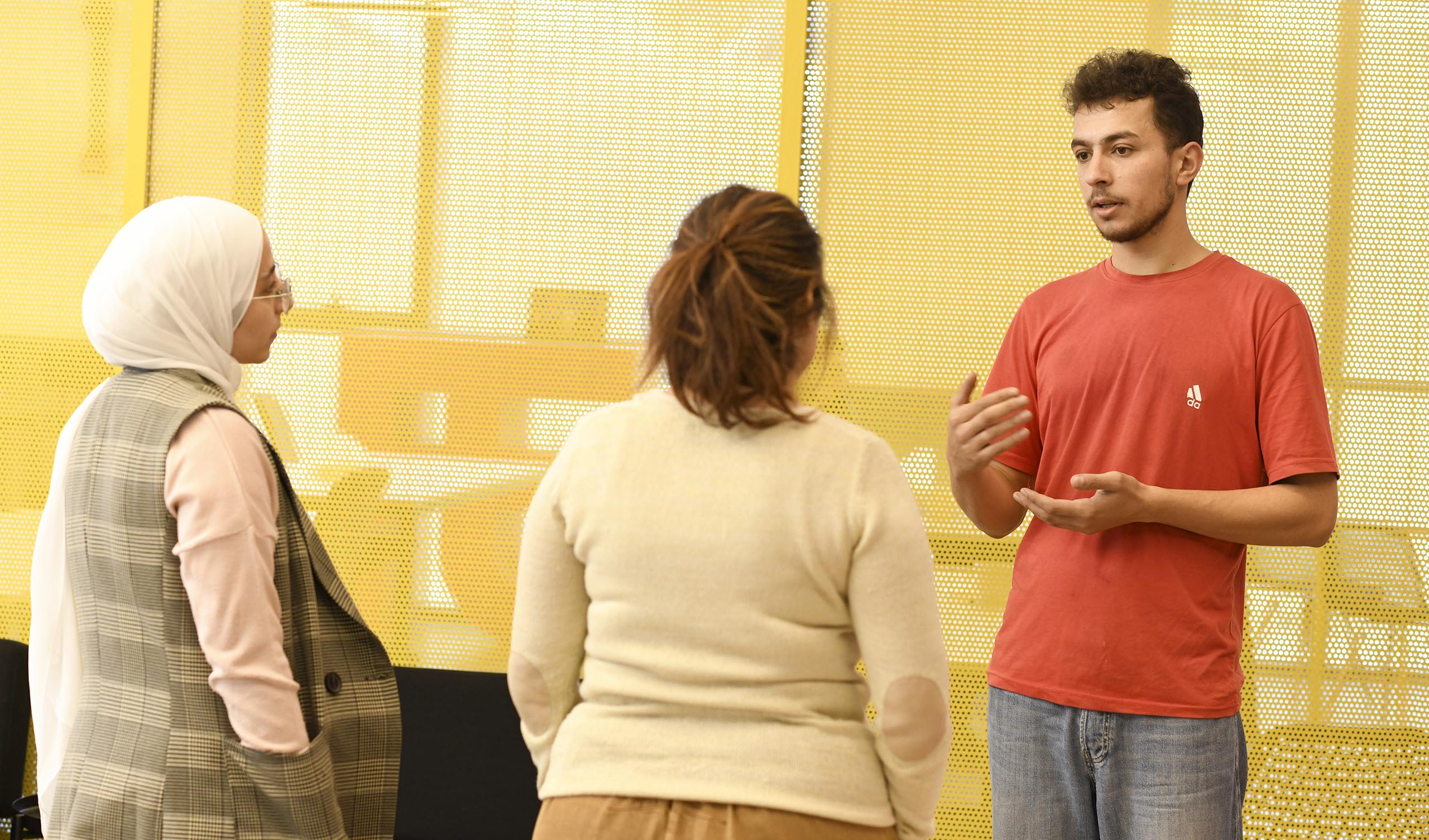
Owier with his Flat6Labs colleagues.
Owier with his Flat6Labs colleagues.
Forward momentum
Owier feels he is already on the road to making a contribution to Jordan’s economy. He has managed to raise $20,000 in funds within two years of operation. He hopes that his company can expand to Australia, Bahrain, France, and the U.S.—which, according to Owier’s research, are countries with markets that would respond to Scrap’s business model. Owier is aiming to register 10,000 users in a year and recycle over 10,000 tons of products.
Al Kordi aims to have 8 percent of the market share of the $30 million motorcycle spare parts market within a year. He plans to later expand in the Middle East and North Africa region, starting with Egypt, Jordan, and Saudi Arabia.
Both entrepreneurs say they have benefitted from guidance they have received from StartMashreq.
Support from the startup ecosystem is another key requirement for refugee entrepreneurs, according to Najjar and Elrjula. This was important to the success of Matjarbot, an e-commerce startup enrolled in the incubation program. The company, co-founded by a Syrian refugee, was able to secure a $20,000 grant from Orange Innovation Space. Advisors from the program will guide the founders on how to develop their business using the funds.
Omar is hoping to see similar achievements as StartMashreq gains momentum.
In the coming years, she says, the project will support startups through the incubation and growth tracks, and reach thousands of entrepreneurs through its educational program and learning academy.
“Refugees take their dreams and ambitions with them as they flee their countries, hoping to achieve those dreams one day," Omar adds. "That's what the entrepreneurship program aspires to help them do."
Ahmad Medhat and Yasmine Al Farra contributed to this story.
Julia Schmalz and Alison Buckholtz produced this story.
Published December 2023
